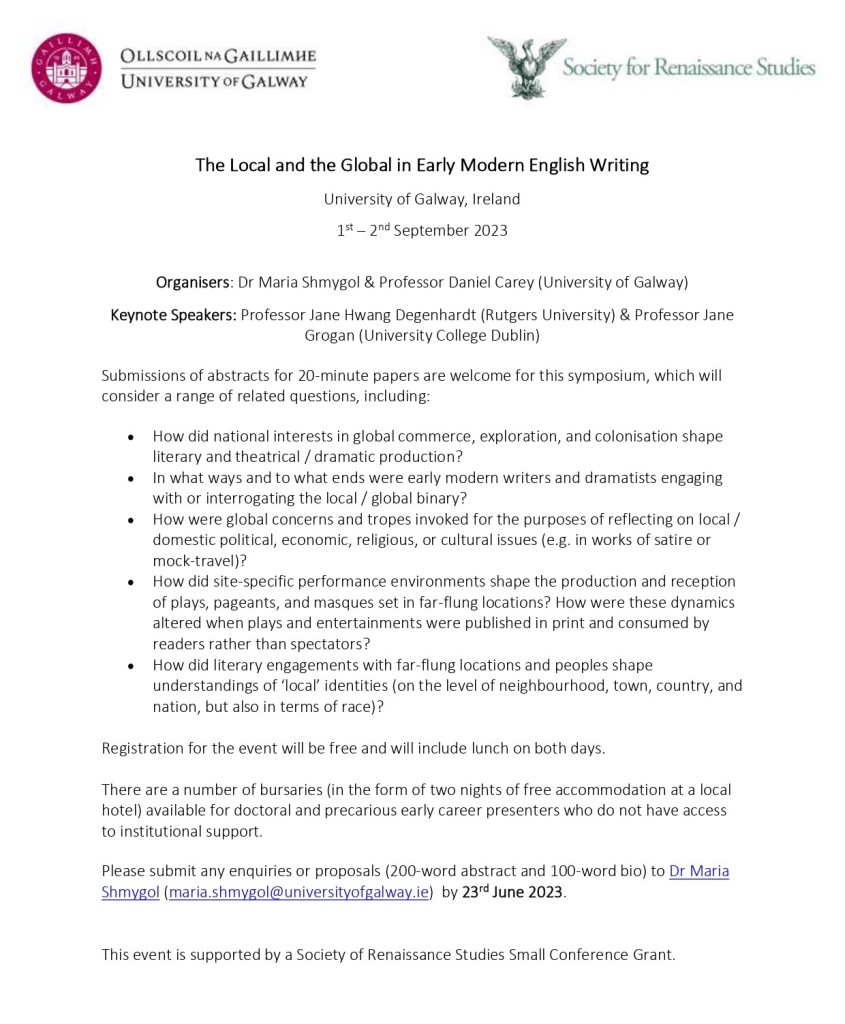#writinglivesUCD
Thursday 6th September 2018, Humanities Institute, UCD
9-9.30 Registration and coffee
9.30-11 Plenary I: Prof Andrew Hadfield (Sussex), Reading The Life Between the Lines: Nashe, Spenser and Others
11-11.30 Coffee
11.30-12.30 Panel 1: The Religious Self
Richard Kirwan (UL) “Trouble Every Day: Experiences of Religious Exile in the Writings of Jacob Reihing”
John McCafferty (UCD) ‘”O Felix Columba Caeli/ O Happy Dove of Heaven”: a manuscript life shredded by early modern print’
12.30-1.30 Lunch
1.30—2.30 Panel 2: Unmooring life-writing: method, memory, and genre
Chair: Prof Kate Chedgzoy (Newcastle)
Ramona Wray (QUB), “Reading Life-Writing in the Cary/Tanfield Record”
Kate Hodgkin (U of East London), “Memory, melancholy and the languages of loss in 17th century life writing”
2.30-3 Break
3-4.15 Panel 3: – Life writing and religion
Ann-Maria Walsh (UCD) “Mary (née Boyle) Rich, Countess of Warwick (1624-1678): Writing and Experimenting – A Spiritual Life”
Mark Empey (NUIG) “Life writer and Life writing: the parallel worlds of Sir James Ware”
5pm Wine reception – Common Room, Newman Building, UCD
Friday 7th September 2018, K114, Newman Building, UCD
9.30-11 Plenary II: Prof Kate Chedgzoy (Newcastle), Writing Children’s Lives
11-11.30 Coffee
11.30-1 Panel 4 – Women in the 17th Century
Carol Baxter (independent scholar) “’Serving God rather than my father’: religious life writing as a rejection of the patriarchal family”
Naomi McAreavey (UCD) – The Countess of Ormonde’s Letters (title tbc)
Danielle Clarke (UCD) “Irish women’s recipe books as life writing: form, process, method”
1-2pm Lunch (exhibition and archive visit)
2-3pm Panel 5 – Travel and formation of the self
Maria Luis Dominguez-Guerrero (Seville) “Rhetoric of the Conquest: Narrations from Castilian Explorers”
Eva Holmberg (Helsinki) “Visual Self-Description in Seventeenth-Century British Travel Accounts”
4-6pm Walking tour of Renaissance Dublin (AM Walsh), followed by pub visit and conference dinner, at Le Pichet, Trinity Street, Dublin 2* [* Dinner is €40 per head. ]
Saturday 8th September 2018, K114, Newman Building
9.30-11 Plenary III: Prof Alan Stewart (Columbia), Writing Lives under Duress
11-11.15 Coffee
11.15-1 Panel 6 – Alternative Forms
Nelson Marques (Miami) “War and Self: Soldier’s Petitions in Seventeenth-Century Portugal”
Emma Claussen (Oxford) “Forms of living in Descartes’s Les passions de l’âme”
Raluca Duna (Bucharest) “Writing the self with images, painting identity with texts”
1-1.30pm Roundtable and close
Followed by optional lunch in Donnybrook, Dublin 4.
The conference is free to attend, but for catering purposes the organisers would appreciate it if you could sign up using this link: https://www.eventbrite.com/e/writing-lives-1500-1700-tickets-48653964317
If you have any questions, please email the organisers at writinglives@ucd.ie.
This conference is supported by the College of Arts and Humanities and the Humanities Institute, UCD.
#writinglivesUCD
Image credit: ‘The Librarian’, Giuseppe Arcimboldo, c.1566 (Skokloster Castle)













